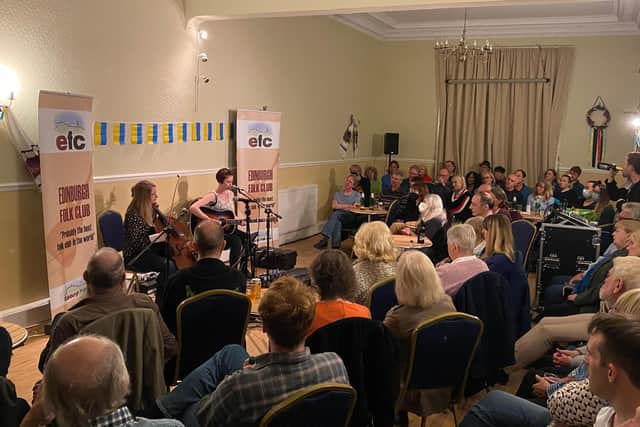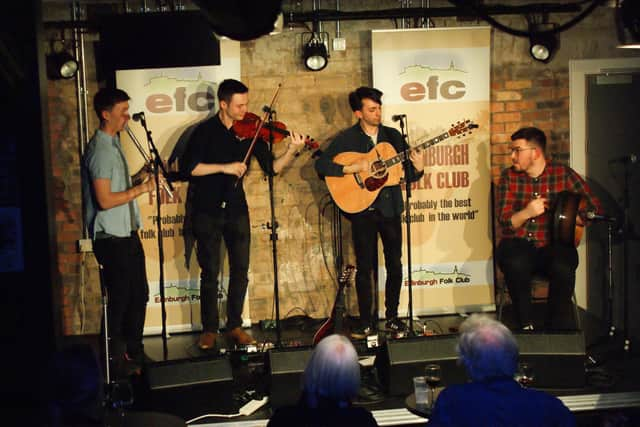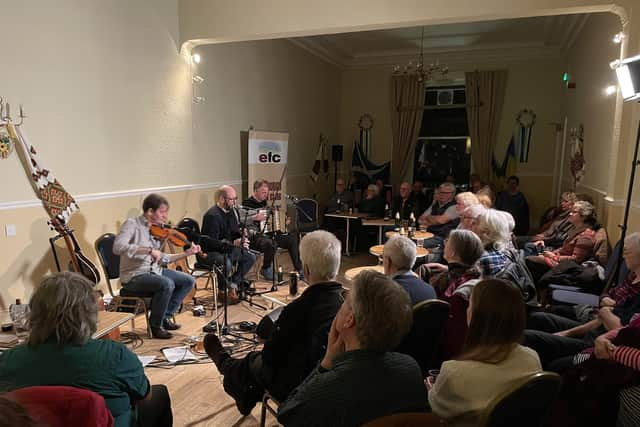Weekly live music night in Edinburgh faces the axe after more than 50 years
One of Scotland's longest-running live music nights is facing the axe months after it celebrated its 50th anniversary.
Financial problems caused by dwindling audience numbers has left Edinburgh Folk Club at "substantial risk" of collapse after running up "heavy losses" in recent years.
Advertisement
Hide AdAdvertisement
Hide AdOrganisers say the business model of the club, which is based at the Ukrainian Community Centre on Royal Terrace, is no longer fit for purpose. Its entire committee has signalled its intention to step down in the face of the "accelerating erosion" of its financial reserves and the aging demographic of its audiences.


However, they hope an appeal for “new blood” from within the music scene to form a new committee can still secure the club’s future.
The financial crisis has emerged despite the 80-capacity club nights securing funding from Creative Scotland for its 50th anniversary season.
The threats to its future have emerged months after Edinburgh promoters Soundhouse pulled the plug on their weekly gigs at the Traverse Theatre.
More than 2,000 gigs have been staged under the folk club banner since it was launched in September 1973 in the basement of the Chaplaincy Centre on George Square.


Acts who have appeared have included Dick Gaughan, Michael Marra, Davy Steele, Archie Fisher, Rab Noake, Anna Massie, Ryan Young, Jenn Butterworth, Iona Fyfe and Karine Polwart.
The club, which has organised an annual song-writing competition since 1976, has had various home across the city, including the Pleasance, the Cafe Royal, the Osborne Hotel, the Carlton Hotel and the West End Hotel.
Advertisement
Hide AdAdvertisement
Hide AdHowever, its five-strong committee, who have highlighted how they are all in their 60s or 70s, has decided to step down in the wake of an extraordinary general meeting called to discuss the financial crisis.
In an update to members and supporters, treasurer Pam King said: “Reasonable rates to performers cannot be met by the combination of membership fees and admissions money as we are presently set up. We have tried restructuring percentages to performers, membership fees, admissions, but what amounts to tweaking is simply not closing the gap.


“Moreover, in the present season we have a heavy subsidy from Creative Scotland, allowing weekly live-streaming, the payment of full Musicians Union rates, and the employment of a PR firm to boost publicity.
"We continue to record heavy losses and, of greatest concern, thorough coverage in print and on-line media has had negligible influence on audience size.
"The committee has argued itself to a standstill about these trends for some years now, and the time has come for present members at least to retire defeated.”
An update issued to supporters after the extraordinary general meeting said: “The financial circumstances of the club suggest that new blood is needed if the club is to recover its viability into the future.
“The club used to go into each season with sufficient in the bank to cover the obligations to acts booked for the whole season. But we have seen an annual and accelerating erosion of our capital buffer to the present point, which we judge to present substantial risk.”
Advertisement
Hide AdAdvertisement
Hide AdDr John Barrow, chair of the club and one of its co-founders, said: “The irony of our situation is that there are loads of terrific young performers in the Scottish folk scene, but their contemporaries just don’t appear in the audience.
“It’s very frustrating. Nobody seems to have the answer for it and there is probably no one single answer, but our business model as it stands is broken.”
Comments
Want to join the conversation? Please or to comment on this article.
